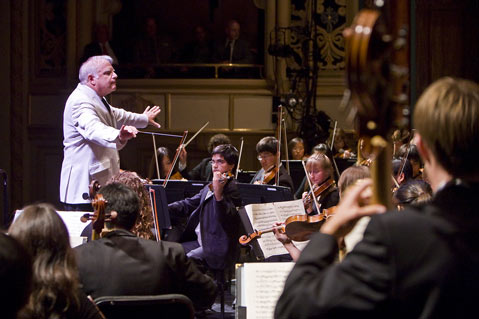Academy Festival Orchestra Season Finale
Conductor Leonard Slatkin Led Saturday's Concert at the Granada

The finale of the Academy Festival Orchestra season always gets a boost from the jubilant mood that captures participants and spectators alike as this most elite of summer music programs concludes another year. During this time, the musicians are feeling the uplift of completing their rigorous programs of practice and performance, and the audiences are saturated with the sights and sounds of weeks of impressive music making and gala events. As a result of this happy confluence, the lobby of the Granada buzzed with happy conversations that gave way to smiling faces when everyone sat down in the hall this past Saturday.
The first piece on the program, Benjamin Britten’s Sinfonia da Requiem, Op. 20, is headlong and episodic in structure, and it allowed Maestro Leonard Slatkin to begin the evening’s exploration of tempo with plenty of brass. The piece contains an unusual crescendo that occurs well before the real end, and then actually ends in what sounds like a question. In any event, it made for some stirring and dramatic music.
Aaron Copland’s A Lincoln Portrait, and in particular the narration, beautifully voiced by DeAndre Simmons, received an enthusiastic response from the audience. Perhaps the refrain that “we cannot escape history” struck home among those present who remember the original context of this work, which was commissioned for the war effort in 1942.
The Tchaikovsky Symphony No. 4 in F Minor, Op. 36 that followed the intermission was outstanding-just the sort of tour de force that sends the audience immediately to its feet for a standing ovation. And Slatkin was a constantly moving ball of concentrated energy-energy that then became unleashed through the orchestra. This symphony has a scherzo that is played nearly all pizzicato and staccato, and the Festival Orchestra turned this sequence into a thrilling adventure in sound, clearly articulated and set solidly in time. In a fittingly grand conclusion to another season of great work, this difficult music, so passionate and full of personal meaning and history for the composer, was given a new life by the young players and their connection with the conductor and the audience.



